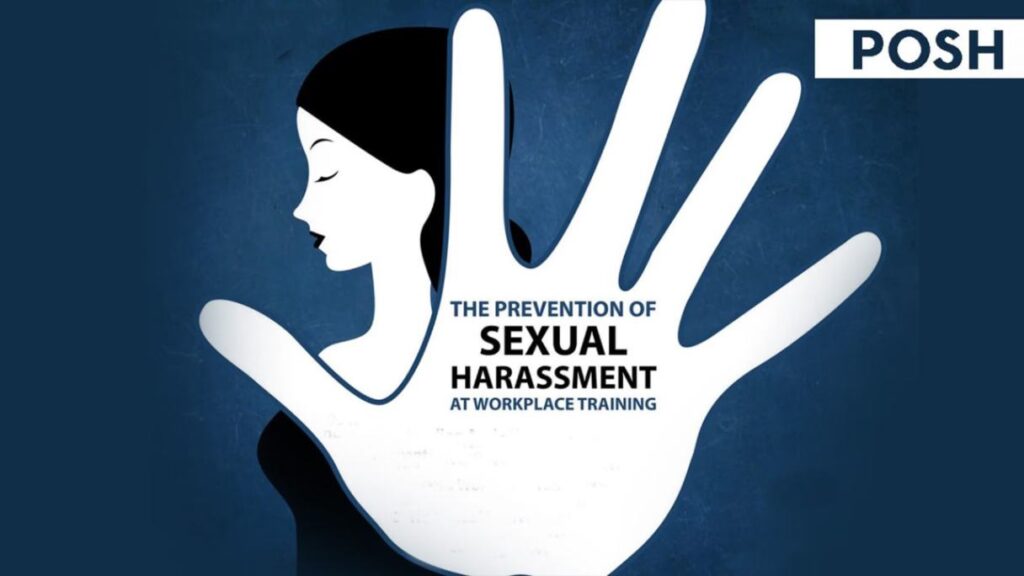In today’s corporate landscape, ensuring a safe and respectful workplace for all employees has become a legal and moral necessity. Organizations are no longer judged solely on profitability but also on how they uphold values such as gender equality, dignity at work, and employee well-being. One of the most significant steps in this direction is the implementation of POSH training – an essential initiative to prevent sexual harassment at the workplace.
But what exactly is POSH training? How is it conducted? And why is it indispensable in modern workplaces? This blog dives deep into the what, how, and why of POSH awareness training and explains its growing importance in Indian workplaces.

What is POSH Training?
POSH training, short for “Prevention of Sexual Harassment” training, is designed to educate employees and management about workplace sexual harassment, its implications, and the legal and ethical obligations associated with it. The training is guided by the Sexual Harassment of Women at Workplace (Prevention, Prohibition and Redressal) Act, enacted in India in 2013.
The POSH Act mandates that every employer must take steps to prevent sexual harassment in the workplace, including organizing training for all employees, especially Internal Committee (IC) members who are responsible for investigating complaints.
Objectives of POSH Training:
- Raise awareness about what constitutes sexual harassment.
- Create a culture of respect and dignity.
- Educate employees about their rights and responsibilities.
- Outline the complaint and redressal mechanism.
- Enable the Internal Committee to handle cases with sensitivity and legality.
Types of POSH Training
POSH is not a one-size-fits-all process. Depending on the target audience and organizational requirements, the training is tailored into different formats:
1. Employee Awareness Sessions
These sessions are designed for all staff members, including full-time employees, interns, consultants, and contractual workers. The training covers:
- Definition and examples of sexual harassment.
- Preventive measures.
- How to file a complaint.
- Role of bystanders and colleagues in prevention.
2. Internal Committee (IC) Training
IC members require in-depth knowledge of the legal aspects of the POSH Act, case handling, investigation procedures, and reporting. The POSH for IC members includes:
- Detailed understanding of the POSH Act.
- Legal and procedural compliance.
- Drafting notices and maintaining confidentiality.
- Understanding trauma-informed approaches.
3. Managerial Training
Managers often act as the first point of contact for distressed employees. Training for them emphasizes:
- Recognizing early signs of misconduct.
- Creating an inclusive work culture.
- Managing complaints with empathy and neutrality.

How is POSH Training Conducted?
Organizations can implement POSH training through multiple formats, ensuring accessibility and retention:
1. In-person Workshops
Conducted by certified POSH trainers, these interactive sessions involve case studies, role plays, Q&A sessions, and real-life scenarios. They are highly effective in promoting engagement and awareness.
2. Virtual Webinars
With the rise of remote work, online POSH has gained popularity. These sessions use video conferencing tools, making it easier to include remote teams.
3. E-learning Modules
Self-paced POSH training courses with assessments and interactive content allow organizations to reach large audiences while maintaining records for compliance.
4. Annual Refresher Training
To keep the workforce updated, many companies conduct annual refresher POSH training to reinforce awareness and address recent developments or changes in law.
Why POSH Training is Essential

1. Legal Compliance
According to the POSH Act, it is mandatory for organizations with 10 or more employees to:
- Establish an Internal Committee.
- Conduct regular POSH training.
- Display POSH policy prominently in the workplace.
Non-compliance can result in heavy penalties, cancellation of licenses, or even legal action.
2. Creating a Safe Work Environment
POSH promotes a culture where employees feel safe to report incidents without fear of retaliation. A safe environment encourages productivity, loyalty, and morale.
3. Preventing Reputational Damage
A single case of mishandled sexual harassment can damage a company’s reputation, impacting client trust, investor confidence, and employer branding. POSH mitigates such risks through proactive awareness.
4. Boosting Employee Confidence
Employees, especially women, are more likely to stay and grow in an organization where their safety is prioritized. POSH sends a strong message that the company respects dignity and equality.
5. Improving Organizational Culture
Beyond legal compliance, POSH training fosters an environment of respect, sensitivity, and empathy – qualities that contribute to a healthy workplace culture.
Key Elements of an Effective POSH Training Program
A successful POSH training initiative must be well-rounded, engaging, and inclusive. Here are some elements that should be included:
1. Real-World Case Studies
Discussing high-profile and real-life workplace harassment cases (anonymously) helps employees relate and understand consequences.
2. Interactive Engagement
Quizzes, role-playing, and group discussions promote better understanding and retention.
3. Clear Policies and Procedures
POSH training should clearly explain the company’s internal sexual harassment policy, complaint filing process, timelines, and consequences of misconduct.
4. Inclusivity
While the POSH Act focuses on the protection of women, POSH training should emphasize respect and protection for all genders, including LGBTQ+ employees.
5. Confidentiality and Empathy
Training must underline the importance of handling complaints confidentially and sensitively to avoid re-traumatizing the complainant.
Common Myths Around POSH Training
Myth 1: POSH is only for women.
Fact: While the Act protects women, POSH training is meant for all employees to create a gender-sensitive workplace.
Myth 2: POSH training is only for large companies.
Fact: Even startups and small businesses with 10+ employees are legally bound to conduct POSH training.
Myth 3: One-time training is enough.
Fact: Regular refreshers and updates are essential to keep the workforce informed and sensitive to evolving norms.
Challenges in Implementing POSH Training
Despite the legal mandate, many companies face roadblocks in rolling out POSH training effectively:
1. Lack of Awareness or Urgency Among Top Management
Many senior leaders underestimate the importance of POSH training, viewing it as a formality rather than a necessity. This leads to insufficient support, poor implementation, and limited organizational impact.
2. Budget Constraints in Small Organizations
Smaller companies often struggle with limited financial resources, prioritizing operational costs over training initiatives. As a result, POSH training is either delayed or conducted ineffectively, leaving compliance and safety compromised.
3. Tokenism – Training as a Checklist Activity
Some organizations conduct POSH training only to meet compliance standards, without genuine effort or engagement. Such superficial training lacks depth, fails to instill awareness, and does not drive real cultural change.
4. Poor Trainer Quality and Delivery Methods
Inadequately trained or unqualified POSH trainers can deliver monotonous or generic sessions. This leads to disinterest among employees, minimal knowledge retention, and a failure to convey the seriousness of the subject.
Overcoming these challenges requires genuine commitment from leadership and investment in credible training resources.
Measuring the Success of POSH Training
To assess whether POSH training is effective, organizations must:
1. Track Employee Participation and Completion Rates
Monitoring attendance and completion helps organizations ensure that all employees receive the necessary POSH training, highlighting coverage gaps and demonstrating the organization’s commitment to legal compliance and workplace safety.
2. Conduct Pre- and Post-Training Assessments
Assessments before and after training help measure knowledge gained, identify learning gaps, and evaluate how effectively the content was understood, ensuring that training is impactful and achieves its intended objectives.
3. Evaluate the Number and Nature of Complaints
An increase in complaints may indicate growing employee awareness and trust in the redressal system, showing that POSH training is helping victims feel more confident in reporting incidents safely.
4. Gather Feedback Through Anonymous Surveys
Anonymous feedback allows employees to share honest opinions about the training experience, relevance, and content quality. This input is crucial for improving future sessions and ensuring continuous organizational learning.
Continuous improvement based on insights is key to impactful POSH training.
The Role of HR in POSH Training
The Human Resources department plays a crucial role in implementing POSH training:
- Organizing and scheduling sessions.
- Keeping detailed training records.
- Updating POSH policies.
- Coordinating with external trainers and legal advisors.
- Supporting IC members in investigations.
HR’s proactive role ensures that POSH training becomes part of the company’s cultural fabric.
Case Study: The Vishaka Guidelines – The Foundation of POSH Law in India
The origin of the POSH Act is deeply rooted in a landmark legal case that changed the course of workplace safety and gender justice in India. This case is famously known as the Vishaka vs. State of Rajasthan (1997).
Background:
The case arose after Bhanwari Devi, a social worker in Rajasthan, was gang-raped by five men while attempting to stop a child marriage in her village. Despite being a government-appointed worker, Bhanwari Devi received little to no support from local authorities, and the legal proceedings were weak and delayed.
This horrifying incident exposed the lack of mechanisms to protect women from sexual violence and harassment at the workplace. It also highlighted the systemic failure of institutions to provide justice, support, or even proper complaint redressal.
The Legal Turning Point:
A group of women’s rights organizations, including Vishaka, filed a Public Interest Litigation (PIL) in the Supreme Court of India demanding guidelines for the protection of women in the workplace.
In a historic judgment in 1997, the Supreme Court laid down the Vishaka Guidelines, which:
- Defined sexual harassment for the first time in the Indian legal framework.
- Mandated the formation of a complaints committee at workplaces.
- Outlined the responsibilities of employers in preventing and addressing sexual harassment.
- Called for a safe working environment, especially for women.
Impact:
The Vishaka Guidelines acted as the first formal framework to address sexual harassment at work. These guidelines remained the de facto law until the Sexual Harassment of Women at Workplace (Prevention, Prohibition and Redressal) Act was officially enacted in 2013.
Why This Case Matters for POSH Training:
Understanding the Vishaka case is crucial for anyone involved in POSH training—it highlights:
- The real-world need for legal protection against workplace harassment.
- The importance of complaint mechanisms within organizations.
- The role of HR, managers, and internal committees in upholding justice and dignity.
This case is more than just a legal precedent; it is a reminder of the human cost of negligence and the powerful change that law and awareness can bring when implemented effectively.
Conclusion
Workplace safety and dignity are non-negotiable. POSH training is not merely a compliance activity—it is a commitment to creating a culture where employees feel safe, respected, and empowered. From preventing incidents to handling them appropriately when they occur, POSH training equips both employees and leaders to maintain a harassment-free environment.
As organizations continue to evolve in the era of inclusivity and equality, prioritizing POSH training will remain a cornerstone of ethical, responsible, and progressive corporate governance. Companies that invest in authentic POSH not only fulfill a legal obligation but also lay the foundation for a strong, motivated, and loyal workforce.

